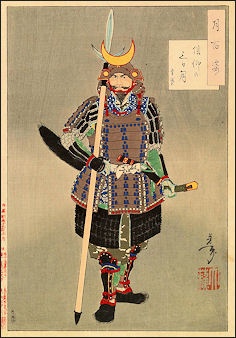
Samurai in the Tokugawa era were not like the samurai in previous eras. Even though there were no battles being fought on the island, and no armies leaving Japan to fight somewhere else, there were still samurai in Japan. They became civil servants during the Tokugawa era. Some had jobs that were relevant for samurai, such as guards, or working in stables with horses. The majority were in office jobs.
One samurai, Asahi Bunzaemon (1674-1718), kept a journal about his time being a guard. Guards like him would work three days a month, with a twenty-four hour shift every nine days. Asahi and the other guards would protect the castle's keep where the daimyo slept. It was an important job, but an easy one, and many nights the guards would party instead. A lot of samurai in this period enjoyed drinking and gambling, sometimes while at their jobs.
Samurai would be some of the poorest people in Japan, due to their drinking and gambling. Their daimyos were also sometimes running out of money while they were trying to make their castles nicer, leaving less money to pay their samurai with (Gates, "Samurai").
Bushido, the way of the warrior, was formally stated for the first time in the Tokugawa period. In this time, the sword became the symbol of the samurai, there was a new emphasis on a samurai's loyalty to his master, and many ideal ideas about samurai came out of this time (Nitobe).
The "ideal" samurai, a strong, loyal fighter, never really existed. There were good and bad samurai, but many were loyal only to themselves. One group in this era stood out though, a group of forty seven samurai. Their master, Asano Naganori attempted to kill Kira Yoshinaka in 1701, and was forced to commit seppuku. Two years later, forty seven of his former samurai, now ronin (masterless samurai) plotted to avenge Asano, and killed Kira themselves, displaying this ideal for loyalty in a samurai. The shogun could not allow them to remain free after killing Kira, but allowed them to keep their honor in death, and ordered them to commit seppuku (Ikegami, 223-240).
